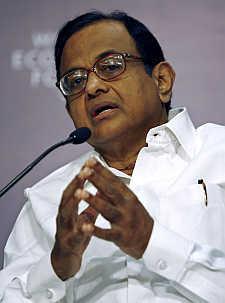 | « Back to article | Print this article |
 Finance Minister P Chidambaram, obviously exasperated by the complaints he’s heard from US business and industry leaders over the past two days in New York and Washington, DC, made use of his keynote address at the US-India Business Council’s 38th anniversary leadership conference, speaking slowly and deliberately to counter America Inc’s angst point by point and turn the tables by highlighting cracks in US policies on several fronts.
Finance Minister P Chidambaram, obviously exasperated by the complaints he’s heard from US business and industry leaders over the past two days in New York and Washington, DC, made use of his keynote address at the US-India Business Council’s 38th anniversary leadership conference, speaking slowly and deliberately to counter America Inc’s angst point by point and turn the tables by highlighting cracks in US policies on several fronts.
Addressing a sold-out audience of over 350 representatives of American corporate and industry heavyweights and several Obama administration officials and US lawmakers, Chidambaram said all he had heard since he came to the US seeking US foreign direct investment, was “the lament about the last two years.”
He said: “The last two years have been bad for everyone - the last two years have been bad for every country of the world. Growth has dipped, the eurozone crisis has made matters worse and the World Economic Outlook update of a couple of days ago does not offer a very bright prospect for the rest of 2013 either.”
Chidambaram said: “During this period, between the United States and India, we did take a number of measures to strengthen the relations, but in a period of low growth and in a period of recession, I am not surprised that we seek to emphasise not the positives but the negatives.”
“Much of what I’ve heard over the last couple of days is because businesses are facing challenges, and we tend to blame each other for the challenges that we face, rather than find ways to overcome these challenges,” he said.
Chidambaram then went on to enumerate a laundry list of accomplishments, starting off by noting that two-way trade between India and the US was over $100 billion, unimaginable a couple of decades ago and well beyond “the reach of India that had a closed economy.”
“Today, $100 billion seems far below our potential and we have the capacity to raise it several fold,” he said, and added, “Two-way investments between India and the US have crossed $30 billion.”
But, “Yet, there are huge opportunities for US companies to invest in India and good opportunities for Indian companies to invest in the US,” he added.
Chidambaram said: “In the last two days, I’ve heard that there is a sense of angst among US business about recent developments, much of it because the economies are growing at a slow pace.”
“If India was growing at over 8 per cent and if the US was growing at 3 per cent, much of this angst will disappear,” he quipped.
Chidambaram then went on to fault the US on issues India found it wanting apparently in an effort to vent his frustration over the drum-beat of complaints he had been pounded with since his arrival in New York in his second trip to the US in less than three months.
Taking on immigration, he said, “To the best of my understanding, in no language, in no dictionary, is immigration defined as including temporary relocating of knowledge workers. Immigration means a desire to migrate into a country and live in that country and become a citizen of that country.”
“Yet, the immigration bill (that recently was approved by the US Senate and is now being taken up by the US House of Representatives) has a clause which seem to erect non-tariff barriers on temporary relocation of knowledge workers.”
Chidambaram also said, he had “heard concerns about intellectual property,” but argued that “facts are sacred. I know that there is concern that India granted a compulsory license to one drug.”
But he asserted, “In all these years, in the 66-67 years we’ve been independent, India’s granted one compulsory license - just one. The developed world has granted 50 compulsory licenses. Canada has granted four, Italy four, Malaysia, Indonesia, and the United